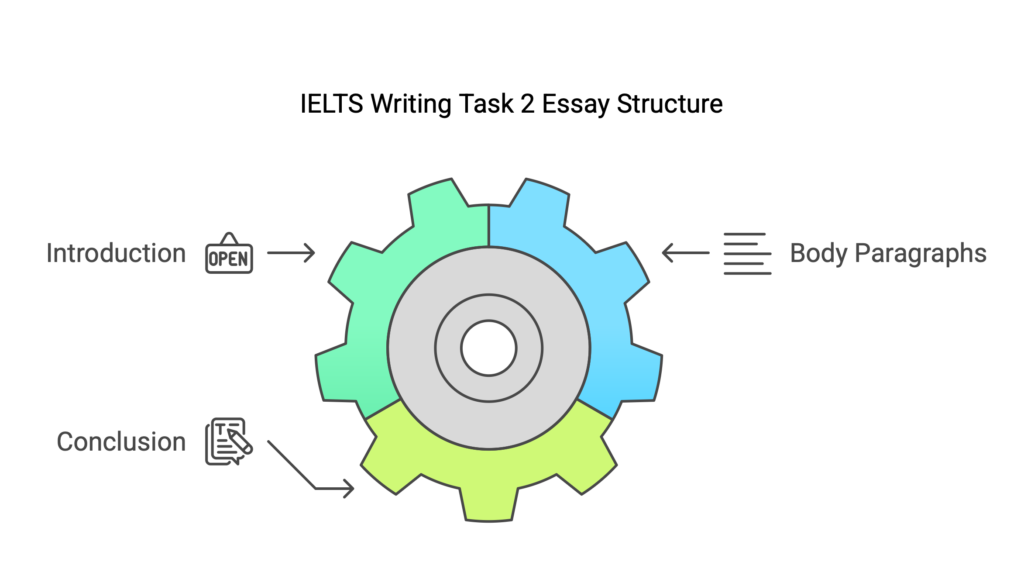If you’ve ever felt overwhelmed by IELTS Writing Task 2, you’re not alone. Many test-takers find it complicated, but here’s the truth: it doesn’t have to be. The key to acing this section lies in understanding the task and its requirements—nothing more, nothing less. In other words, once you understand the IELTS Writing Task 2 structure, you will be OK with this task. Let’s break it down step by step so you can approach it with confidence and clarity.
Table of Contents
Why Do People Find IELTS Writing Task 2 Complicated?
The main reason people struggle with IELTS Writing Task 2 is that they overcomplicate it. They focus on memorizing complex vocabulary, writing long essays, or following rigid templates without truly understanding what the task requires. But here’s the good news: once you understand IELTS Writing Task 2 structure and expectations, it becomes much simpler.
The Secret to Success: Understand the Task and Requirements
To succeed in IELTS Writing Task 2, you only need to do two things:
✨Understand the task.
✨Meet the requirements.
That’s it. Let’s dive into what this means.
Step 1: Understand the Task
Every IELTS Writing Task 2 question has two parts:
The Prompt: This includes the topic and arguments or ideas related to it.
The Questions: These are the specific instructions you need to address in your essay.
For example, here’s a sample task:
Prompt: Some university students want to learn about other subjects in addition to their main subjects. Others believe it is more important to give all their time and attention to studying for a qualification.
Questions: Discuss both views and give your opinion.
To tackle this, you need to:
👉Identify the topic (elective courses’ impact on students).
👉Address both sides of the argument (should learn elective courses vs. no elective courses).
👉Clearly state your opinion.

Step 2: Understand the Requirements
Your essay must follow a clear IELTS Writing Task 2 structure to meet the requirements. Here’s what each part should include:
Introduction:
✨Paraphrase the prompt to show your understanding.
✨Provide a short answer to the question or a brief overview of your essay.
Example:
Example:
“While some university students are eager to take extra-curricular classes in addition to their primary topics, others are certain that it is more essential for them to dedicate their time and focus to obtaining the qualification. This essay will analyze both points of view and present my opinion on the subject.”
Body Paragraphs:
Explain the answer provided in the Introduction clearly and logically.
Remember:
✨Dedicate each paragraph to one main idea.
✨Explain your points clearly and support them with examples.
For the Introduction above, I will have three body paragraphs.
👉BP1: Enrolling in subjects that are not directly relevant to the major allows students to have a more calm and pleasurable academic experience while earning extra credits, as the major topics might get exhausting.
(This main idea is then explained in detail with a specific example.)
👉BP2: Students, on the other hand, must gain fundamental knowledge about the fields they chose in order to graduate and become certified workers, which demands their entire attention and concentration on their key courses. Everything else may cause distractions.
(This main idea is then explained in detail with a specific example.)
👉BP3: Students have the right to choose their elective courses; nevertheless, these classes should be omitted from the grading system because it is unjust to others who are indifferent.
(This main idea is then explained in detail with a specific example.)
Conclusion:
✨Summarize your main points.
✨Restate your opinion or answer to the question.
IELTS Writing Task 2 – What is a good conclusion?
See the full essay below.
Bonus Tips for Success
✨Practice Paraphrasing: This skill is crucial for writing a strong introduction and avoiding repetition.
Build your “Automatic Paraphrasing Brain”
✨Use Examples: Real-life examples make your arguments more convincing.
✨Stay Focused: Stick to the topic and avoid going off-topic.
✨Manage Your Time: Spend 5 minutes planning, 30 minutes writing, and 5 minutes reviewing.
Sample
Introduction
While some university students are eager to[1] take extra-curricular classes[2] in addition to their primary topics, others are certain that it is more essential for them to dedicate their time and focus to obtaining the qualification[3]. This essay will analyze both points of view and present my opinion on the subject.
Body Paragraphs
On the one hand, enrolling in subjects[4] that are not directly relevant to the major allows students to have a more calm and pleasurable academic experience while earning extra credits[5], as the major topics might get exhausting. A medical student, for example, may benefit from extra-curricular language programs that are not only more enjoyable and simpler to learn than other field-related[6] studies but can also raise his GPA.
Students, on the other hand, must gain fundamental knowledge[7] about the fields they chose in order to graduate and become certified workers, which demands their entire attention and concentration on their key courses. Everything else may cause distractions. For example, it is commonly recognized that[8] medicine is an arduous[9] subject of study in which students must work extremely hard to graduate. If medical students take unrelated subjects, they will become sidetracked and lose focus on what is most important to their future careers.
In my opinion, students have the right to choose their elective courses; nevertheless, these classes should be omitted[10] from the grading system because it is unjust to others who are indifferent. The same medical student should be allowed to enroll in an extra-curricular language class if he so desires, but his results should not be reflected in his GPA, and he should continue to study hard to achieve his degree in medicine, same as his classmates.
Conclusion
In conclusion, some university students would want to take non-field-related classes in addition to their core subjects because it allows them to relax and earn extra credits. Others, however, believe that fully committing to the major[11] courses is more crucial for their job prospects. Personally, I support the right of students to choose, but elective courses should not be academically recorded in the final scores.
[1] Phrase: be eager to do something = want to do something.
[2] Phrase: extra-curricular classes = elective classes.
[3] Phrase: dedicate something to doing something = spend something doing something.
[4] Phrase: enroll in something = take something (for example, classes).
[5] Phrase: earn extra credits = get more credits.
[6] Phrase: A-related (with A being a noun) = related to A.
[7] Phrase: gain fundamental knowledge = get important knowledge.
[8] Phrase: it is commonly recognized that + clause = it is well-known that.
[9] Word: arduous (adjective) = difficult, challenging.
[10] Word: omit (verb) = remove something from something else.
[11] Word: major (adjective) = main, primary, key.
Ready to Take the Next Step?
Now that you know the basics of the IELTS Writing Task 2 structure, it’s time to put your knowledge into practice. Head over to www.practice9.co to try free practice tests and see how well you can apply these strategies.
If you’re looking for personalized guidance to boost your score, I’m here to help. Join my paid services for expert feedback, tailored tips, and proven strategies to ace IELTS Writing Task 2.
Remember, IELTS Writing Task 2 isn’t as complicated as it seems. With the right approach and a bit of practice, you can master it. Start today and take one step closer to your dream score!
Have fun learning.











Responses
Thank you for this post. I think I now know why I feel so confused about IELTS writing essays.
What if I agree with one of the views?
Good question.
You can agree with one of the views. In that case, the view you agree with must be “defended” with a stronger argument. The first body paragraph should be about the view you don’t agree with. The second body paragraph is about the view you agree with and make sure it is stronger and more convincing.
[…] IELTS Writing Task 2 Made Easy: Tips, Structure, and Examples […]